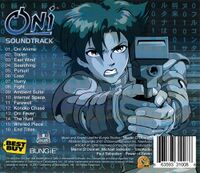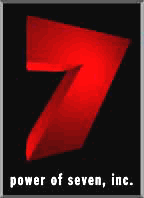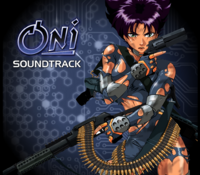Music: Difference between revisions
(adding more detailed justification for assigning certain tracks to TotalAudio; assigning NOLTT to Salter based on email conversation; various wording improvements) |
(more detail on TotalAudio and P7; added link that has all ambient tracks in one place) |
||
| Line 16: | Line 16: | ||
==TotalAudio== | ==TotalAudio== | ||
[[Image:TotalAudio logo.jpg|right]] | [[Image:TotalAudio logo.jpg|right]] | ||
TotalAudio is a music and sound production company founded by | TotalAudio is a music and sound production company founded by Martin O'Donnell and Michael Salvatori, apparently incorporated officially under the name O'Donnell/Salvatori Inc. The company was contracted to score Bungie's games starting with [[Myth|Myth: The Fallen Lords]]. In 2000, Marty would join Bungie as an employee, but TotalAudio continues to operate (at least for the purpose of copyright maintenance and royalty assignment) while O'Donnell and Salvatori have individually gone on to compose for various games. | ||
As for the music written for Oni, O'Donnell stated in [https://halo.bungie.org/misc/nico_marty_interview.html this interview] that he personally composed the half of the soundtrack which Power of Seven did not. In the same interview, Salvatori is referred to as a producer and engineer working with O'Donnell, not as a composer, but the interview was three years after Oni released. O'Donnell seemed to take credit for "Oni Anime" and "Farewell" on his [https://web.archive.org/web/20010203124800/http://mp3.com/artists/18/totalaudio_bungie.html mp3.com artist page]. When O'Donnell released the Oni soundtrack on Bandcamp for a short while, the sheet music for "Hurry" was included as an extra, credited to O'Donnell/Salvatori Inc. but not either specific person. | |||
Based on findings by [https://odysseyaudio.org/ Odyssey Sound Team], who are recreating unreleased music that was produced by TotalAudio for Oni and other games, certain tracks can be assigned to TotalAudio based on the same synthesized instruments being used for their work in later games: Searching and The Hunt, as well as the music in the amasian and xgrv OSBDs (named by fans as "[[Music/CD#Up And Away|Up and Away]]" and "[[Music/CD#Porn Groove|Porn Groove]]"). The unreleased Halo CE tracks [https://www.youtube.com/watch?v=8U53VnSjP94 HERE] and [https://www.youtube.com/watch?v=puXwE00GGDM HERE] use the same samples as Searching, The Hunt, and "Porn Groove". "Up and Away" uses the same patch as Halo CE's [https://www.youtube.com/watch?v=gmVILMlaKJk Perchance to Dream]. | Based on findings by [https://odysseyaudio.org/ Odyssey Sound Team], who are recreating unreleased music that was produced by TotalAudio for Oni and other games, certain tracks can be assigned to TotalAudio based on the same synthesized instruments being used for their work in later games: Searching and The Hunt, as well as the music in the amasian and xgrv OSBDs (named by fans as "[[Music/CD#Up And Away|Up and Away]]" and "[[Music/CD#Porn Groove|Porn Groove]]"). The unreleased Halo CE tracks [https://www.youtube.com/watch?v=8U53VnSjP94 HERE] and [https://www.youtube.com/watch?v=puXwE00GGDM HERE] use the same samples as Searching, The Hunt, and "Porn Groove". "Up and Away" uses the same patch as Halo CE's [https://www.youtube.com/watch?v=gmVILMlaKJk Perchance to Dream]. | ||
| Line 24: | Line 26: | ||
The name echoes Bungie's "cult" of [[Seven|the number 7]], but Power of Seven [https://marathon.bungie.org/story/faq.html#15 was an independent digital music content publisher] founded in Minnesota and headed by Paul Sebastien. Bungie fans also know them for producing the opening themes to [[wp:Marathon 2: Durandal|Marathon 2: Durandal]] and [[wp:Marathon Infinity|Marathon Infinity]]. | The name echoes Bungie's "cult" of [[Seven|the number 7]], but Power of Seven [https://marathon.bungie.org/story/faq.html#15 was an independent digital music content publisher] founded in Minnesota and headed by Paul Sebastien. Bungie fans also know them for producing the opening themes to [[wp:Marathon 2: Durandal|Marathon 2: Durandal]] and [[wp:Marathon Infinity|Marathon Infinity]]. | ||
Sebastien was also a founder of the techno band Psykosonik; over the course of the band's existence (1992–1997), four of their electronic dance songs charted in the Billboard Top 40. In 1996, Power of Seven [https://marathon.bungie.org/story/power_of_seven/power_of_seven.html was acquired by] audio company Headspace, Inc. and the studio was relocated to Headspace's HQ in San Mateo, California. In 1999, Headspace renamed themselves [[wp:Beatnik (company)|Beatnik, Inc.]] | Sebastien was also a founder of the techno band Psykosonik; over the course of the band's existence (1992–1997), four of their electronic dance songs charted in the Billboard Top 40. | ||
In 1996, Power of Seven [https://marathon.bungie.org/story/power_of_seven/power_of_seven.html was acquired by] audio company Headspace, Inc. and the studio was relocated to Headspace's HQ in San Mateo, California. In 1999, Headspace renamed themselves [[wp:Beatnik (company)|Beatnik, Inc.]] (The California company which currently creates meditation audio programs under the name Headspace is unrelated.) Beatnik became defunct in 2011. | |||
===The "trio"=== | ===The "trio"=== | ||
Although the original entity known as Power of Seven ceased to exist when it was integrated into Headspace, Paul Sebastien was allowed to use the name for contracted work outside of the Headspace business. When Oni's upcoming soundtrack first began to get some press, [https://www.gamespot.com/articles/bungies-mp3-contribution/1100-2451769/ this article] from spring 2000 called Power of Seven a "trio, consisting of musicians NVerse, Brian Salter and Kim Cascone." | |||
[[wp:Kim Cascone|Cascone]] is a famous experimental electronic composer, and his work is '' | [[wp:Kim Cascone|Cascone]] is a famous experimental electronic composer, and his work is ''way'' more avant-garde than what you'd expect to hear in a game, though he did score [[wp:Obsidian (1997 video game)|Obsidian]], a 1997 surrealist puzzle game. Cascone briefly mentioned that he was working on "sound design for a Japanese anime game" at the end of [https://web.archive.org/web/20170314155110/http://www.spiderbytes.com/ambientrance/cascone.htm this 1998 interview], which he confirmed by email in 2022 to have been Oni, however he referred to his contributions as "[[wp:Speculative work|spec work]]" and didn't think that his "sound design" was used in the final game. | ||
[http://www.vgmpf.com/Wiki/index.php?title=Brian_Salter Salter], who has composed for other games, also released his own album called "Missing Scenes (1997-2005)" under the artist name Plektric in 2005. The following tracks are very clearly alternate versions of tracks from Oni: | [http://www.vgmpf.com/Wiki/index.php?title=Brian_Salter Salter], who has composed for other games, also released his own album called "Missing Scenes (1997-2005)" under the artist name Plektric in 2005. The following tracks are very clearly alternate versions of tracks from Oni: | ||
| Line 44: | Line 48: | ||
==Tentative attribution== | ==Tentative attribution== | ||
[[Image:OST digital cover.png|200px|thumb|right|The art used for Marty O'Donnell's Bandcamp re-release of the OST (no longer online).]] | [[Image:OST digital cover.png|200px|thumb|right|The art used for Marty O'Donnell's Bandcamp re-release of the OST (no longer online).]] | ||
Based on the style of each composer, their public statements, private correspondence with them, and their released music, we can confidently | Based on the style of each composer, their public statements, private correspondence with them, and their released music, we can confidently attribute some tracks and speculate on the rest: | ||
{| class="wikitable" | {| class="wikitable" | ||
| Line 121: | Line 125: | ||
|} | |} | ||
When it comes to the ambient tracks, attribution for the ones starting with "atm_" remain a mystery. The ones starting with "mus_" are largely or entirely by O'Donnell, which we | When it comes to the ambient tracks (collected [https://iritscen.oni2.net/wiki/ambient/ here]), attribution for the ones starting with "atm_" remain a mystery. The ones starting with "mus_" are largely or entirely written by O'Donnell, which we can say because five out of nine are [[Music/Myth|reused from Myth I/II]] and another one (amasian or "Up and Away") shares the same synthesized instruments as his work on Halo (see "TotalAudio" section above). | ||
[[Category:Music]] | [[Category:Music]] | ||
Revision as of 19:57, 6 January 2023

|

|
| The original promotional CD. | |
Oni's soundtrack is a mix of symphonic/cinematic, electronic/techno, and atmospheric/ambient pieces. As for the question of who composed it, these are the names credited on the back of the CD, but see below for an in-depth investigation:
| “ | Martin O'Donnell, Michael Salvatori - TotalAudio Paul Sebastien - Power of Seven |
„ |
TotalAudio
TotalAudio is a music and sound production company founded by Martin O'Donnell and Michael Salvatori, apparently incorporated officially under the name O'Donnell/Salvatori Inc. The company was contracted to score Bungie's games starting with Myth: The Fallen Lords. In 2000, Marty would join Bungie as an employee, but TotalAudio continues to operate (at least for the purpose of copyright maintenance and royalty assignment) while O'Donnell and Salvatori have individually gone on to compose for various games.
As for the music written for Oni, O'Donnell stated in this interview that he personally composed the half of the soundtrack which Power of Seven did not. In the same interview, Salvatori is referred to as a producer and engineer working with O'Donnell, not as a composer, but the interview was three years after Oni released. O'Donnell seemed to take credit for "Oni Anime" and "Farewell" on his mp3.com artist page. When O'Donnell released the Oni soundtrack on Bandcamp for a short while, the sheet music for "Hurry" was included as an extra, credited to O'Donnell/Salvatori Inc. but not either specific person.
Based on findings by Odyssey Sound Team, who are recreating unreleased music that was produced by TotalAudio for Oni and other games, certain tracks can be assigned to TotalAudio based on the same synthesized instruments being used for their work in later games: Searching and The Hunt, as well as the music in the amasian and xgrv OSBDs (named by fans as "Up and Away" and "Porn Groove"). The unreleased Halo CE tracks HERE and HERE use the same samples as Searching, The Hunt, and "Porn Groove". "Up and Away" uses the same patch as Halo CE's Perchance to Dream.
Power of Seven
The name echoes Bungie's "cult" of the number 7, but Power of Seven was an independent digital music content publisher founded in Minnesota and headed by Paul Sebastien. Bungie fans also know them for producing the opening themes to Marathon 2: Durandal and Marathon Infinity.
Sebastien was also a founder of the techno band Psykosonik; over the course of the band's existence (1992–1997), four of their electronic dance songs charted in the Billboard Top 40.
In 1996, Power of Seven was acquired by audio company Headspace, Inc. and the studio was relocated to Headspace's HQ in San Mateo, California. In 1999, Headspace renamed themselves Beatnik, Inc. (The California company which currently creates meditation audio programs under the name Headspace is unrelated.) Beatnik became defunct in 2011.
The "trio"
Although the original entity known as Power of Seven ceased to exist when it was integrated into Headspace, Paul Sebastien was allowed to use the name for contracted work outside of the Headspace business. When Oni's upcoming soundtrack first began to get some press, this article from spring 2000 called Power of Seven a "trio, consisting of musicians NVerse, Brian Salter and Kim Cascone."
Cascone is a famous experimental electronic composer, and his work is way more avant-garde than what you'd expect to hear in a game, though he did score Obsidian, a 1997 surrealist puzzle game. Cascone briefly mentioned that he was working on "sound design for a Japanese anime game" at the end of this 1998 interview, which he confirmed by email in 2022 to have been Oni, however he referred to his contributions as "spec work" and didn't think that his "sound design" was used in the final game.
Salter, who has composed for other games, also released his own album called "Missing Scenes (1997-2005)" under the artist name Plektric in 2005. The following tracks are very clearly alternate versions of tracks from Oni:
- 1. Furies (Konoko Chase)
- 4. Two New Villains (Whirled Piece)
- 5. Ellipse (Oni Fever, aka Strikers)
- 6. Mr. Bailout (East Wind)
- 7. Drop Zone (Pursuit)
Salter released additional alternate versions of two of these pieces on Smartsound.com: Terminus (Konoko Chase) and Crucial Dossier (Whirled Piece).
It is unknown whether Sebastien himself contributed to the soundtrack, as he may have been busy in his role as Director of Production at Headspace. Was he the mysterious "NVerse"? In any case, about nine days before the above press release naming the trio of "NVerse, Brian Salter and Kim Cascone", Sebastien stated in an interview (now lost) that Power of Seven would also be making "atmospheric ambient" tracks for the game.
Tentative attribution
Based on the style of each composer, their public statements, private correspondence with them, and their released music, we can confidently attribute some tracks and speculate on the rest:
| # | Name | Composer |
|---|---|---|
| 1 | Oni Anime | O'Donnell |
| 2 | Trailer | Sebastien? |
| 3 | East Wind | Salter |
| 4 | Searching | O'Donnell |
| 5 | Pursuit | Salter |
| 6 | Loss | O'Donnell |
| 7 | Hurry | O'Donnell |
| 8 | Fight | ??? |
| 9 | Ambient Suite | Cascone or Salter? |
| 10 | Internal Space | ??? |
| 11 | Farewell | O'Donnell |
| 12 | Konoko Chase | Salter |
| 13 | Oni Fever | Salter |
| 14 | The Hunt | O'Donnell |
| 15 | Whirled Piece | Salter |
| 16 | End Titles | O'Donnell |
| -- | No One Left to Trust (bonus) | Salter |
When it comes to the ambient tracks (collected here), attribution for the ones starting with "atm_" remain a mystery. The ones starting with "mus_" are largely or entirely written by O'Donnell, which we can say because five out of nine are reused from Myth I/II and another one (amasian or "Up and Away") shares the same synthesized instruments as his work on Halo (see "TotalAudio" section above).


